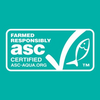
Aquaculture Stewardship Council - Chain Of Custody
About (Aquaculture Stewardship Council - Chain Of Custody)
The Aquaculture Stewardship Council (ASC) Chain of Custody certification is a voluntary certification program that ensures the traceability and responsible sourcing of farmed seafood products. It is part of the broader ASC certification program, which promotes environmentally and socially responsible practices in aquaculture.
The ASC Chain of Custody certification focuses on the entire supply chain of aquaculture products, from the farm to the consumer. It verifies that the seafood products carrying the ASC label have been sourced from ASC-certified farms and have been handled, processed, and transported in accordance with strict requirements to prevent mixing or contamination with non-certified products.
The certification process for ASC Chain of Custody involves the following key elements:
Traceability Systems: Certified entities must have robust traceability systems in place to accurately track the movement of ASC-certified seafood throughout the supply chain. This includes documenting and recording information such as farm identification, batch numbers, and product quantities.
Separation and Segregation: Certified entities must establish and maintain physical and procedural measures to prevent mixing or contamination of ASC-certified products with non-certified products. This includes separate storage, handling, and processing facilities for certified and non-certified products.
Record-Keeping: Certified entities must maintain accurate records of all relevant information related to the movement, handling, and processing of ASC-certified seafood. These records are subject to regular audits to ensure compliance with the certification requirements.
Auditing and Certification: The ASC Chain of Custody certification is conducted by independent third-party certification bodies accredited by the ASC. These certification bodies perform audits to assess compliance with the standards and issue the certification based on the findings.
By obtaining the ASC Chain of Custody certification, seafood suppliers, processors, and retailers demonstrate their commitment to responsible sourcing and provide assurance to consumers that the seafood they purchase has been responsibly produced and handled. The certification helps promote transparency, trust, and sustainability in the aquaculture industry.
The benefits of ASC Chain of Custody certification include:
Market Access and Differentiation: Certified entities gain access to markets that prioritize responsible and sustainable seafood sourcing. The ASC label provides a recognizable and credible mark of responsible aquaculture practices, helping certified products stand out in the marketplace.
Consumer Confidence: The ASC Chain of Custody certification assures consumers that the seafood they purchase comes from farms that meet rigorous environmental and social standards. It allows consumers to make informed choices and support sustainable seafood options.
Risk Mitigation: The certification helps companies manage the risk of purchasing and selling non-compliant or illegally sourced seafood products. By implementing robust traceability and segregation measures, certified entities reduce the risk of inadvertently handling or selling non-certified products.
Alignment with Sustainable Development Goals: The ASC Chain of Custody certification contributes to the achievement of sustainable development goals related to responsible production and consumption, environmental protection, and social responsibility.
In summary, the ASC Chain of Custody certification ensures the traceability and responsible sourcing of farmed seafood products throughout the supply chain. It promotes transparency, trust, and sustainability in the aquaculture industry and provides consumers with confidence that the seafood they purchase has been produced and handled in a responsible manner.